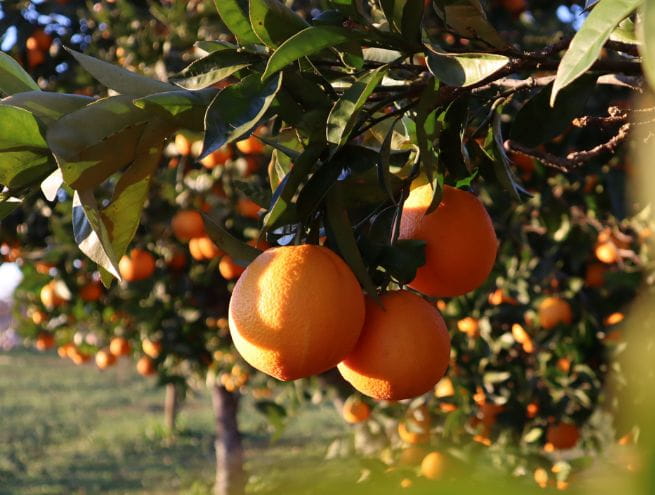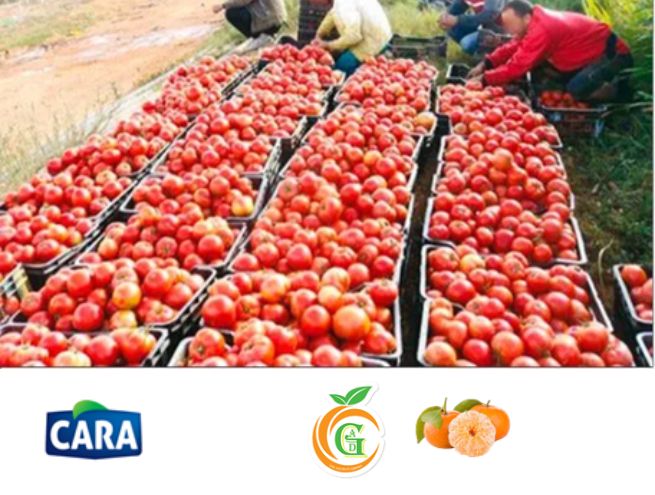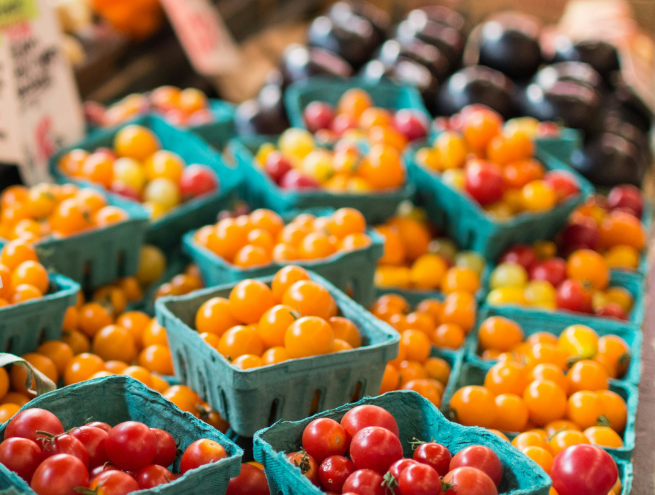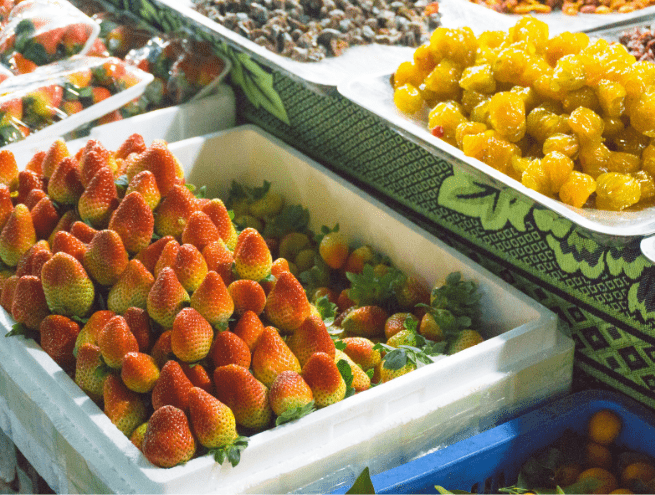What's more, the industry needs PAI fruit and vegetables, and there's still a long way to go to satisfy all needs with local produce.

A fast-growing market
Retail sales of processed fruit and vegetables will increase by 8% in value terms in 2023 to reach DZD 106 billion. Frozen processed fruit and vegetables are the best performing category in 2023, with retail sales by value rising by 8% in current terms to DZD 5.2 billion.
These retail sales are forecast to grow by 2% (in constant 2023 values) over the forecast period to reach DZD 119 billion. Izdihar SpA is the leading player in 2023, with a 33% share of the retail value market.
Developments 2023
The most popular canned peas, corn and tomatoes, considered essential products for the home and used in the preparation of various dishes as well as sauces, salads and soups, continue to boost sales.
Sales trends remained the same in 2023 for processed fruit and vegetables, with city dwellers preferring canned or frozen fruit and vegetables because of their increasingly active lifestyles.
The long tradition of consumption of processed fruit and vegetables shows that demand is mature, and supply already saturated. However, this applies mainly to canned vegetables and, to a lesser extent, canned fruit and tomatoes.
Frozen processed vegetables and canned beans continue to represent a smaller proportion of total sales, with opportunities for growth as the market is not yet mature. However, growth in the category is being held back somewhat by growing consumer health awareness, which is affecting performance due to negative perceptions of chemical colourings and preservatives.
Frozen processed vegetables are becoming increasingly popular for their ease and convenience.
In line with its performance throughout the period, frozen processed vegetables are poised to be the most dynamic in terms of growth in retail volume and current value in 2023. The customer base is still small, but the rate of growth is strong.
As these products can be kept at home for long periods and reduce the time and effort needed to prepare meals, they have also continued to benefit from the growing desire for convenience among Algerians, particularly active urban consumers.
Growing health awareness remained another important driver of demand, as frozen products are often perceived as preserving the nutritional content of vegetables better than canned ones. The increasing availability of these products through modern food retailers has helped to support sales volumes, as has the growing penetration of fridge-freezers in Algerian households.
Examples of major Algerian brands
- La Belle Group's Grande Conserverie Dahmani,
- is opening its ninth major production plant.
- For the first time, the La Belle Group is setting up in the north-west of the country. An expansion and a boost for the national economy and the country's food security
- La conserverie Alimentaire Racherache Abderrazek,
- SME, founded in 2002 to produce bottled fruit juice under the CARAJUS label.
- Built and operational in 2015, it processes 700 tonnes of fresh tomatoes a day to produce double tomato paste in cans.
- Amor Benamor,
- canned tomatoes, harissa, etc.
-
AGD Fruit:
- fruit pulp (apple, pear, mandarin, etc.)

Izdihar SpA, benefiting from its historical presence, will retain its position as market leader in 2023, while private labels remain underdeveloped. Its strong brands in a number of categories and its good reputation have earned it a high level of consumer loyalty.
Algeria's leading cannery boasts modern facilities and innovative production methods, enabling tasks to be automated and reducing costs.
From the field to the factory or the kitchen
Fruit and vegetable sales and trading1
There are 45 existing wholesale markets throughout the country. The Wilayas with an agricultural vocation in particular, which do not have any, are: Ain-Défla, Bouira, Tizi-Ouzou and Jijel: Ain-Défla, Bouira, Tizi-Ouzou and Jijel. Some Wilayas have more than one wholesale market (Mascara (03), Batna (02), Khenchela (02) and Blida (02). Unfortunately, 13 of these are in poor condition. The Boufarik wholesale market dates back to the colonial period, while the Bougara market was set up in the 1970s.
These facilities are generally owned by local authorities and are often a source of revenue for them.
The main products passing through national and regional markets are fruit and vegetables, mainly from national production and possibly from imports. The volume of products passing through these markets is approximately:
- 28,088 tonnes per day, including 18,376.5 tonnes per day of vegetables
- 9,711.5 tonnes per day of fruit, handled by 43,000 traders per day.
The management system is based on cash tenders. However, some are managed directly by the local authorities.
EPE SPA MAGROS has launched a programme to build eight national and regional fruit and vegetable wholesale markets in the Wilayas of Mascara, Sétif, Ain-Defla, Guelma, Ouargla, Djelfa, Biskra and Mila.
The standards adopted for these markets are those set by the FAO.

Four markets are national: Oran (El-Karma), Boumerdès (Khemis El-Khechna), Blida (Bougara) and Biskra (El-Ghrous); Fourteen markets are regional (Wilayas of Tipaza (Attatba), Algiers (Eucalyptus), Djelfa, Blida (Boufarik), Tlemcen, Mostaganem (Sayada), Mila (Chelgoum-Laid), Sétif, Chlef, Mascara (Mohammedia), Annaba (El-Bouni), Ouargla, Constantine and Batna (Oued-Chaaba).
The others are a local vocation.
The production of PAI
A few years ago, 100% of our fruit was imported. This is no longer the case. Algerian fruit is used by 9 operators for primary processing for the food industry, according to Ali Hamani, President of Apab. Although this is still below requirements.
Local fruit purées are partly used in yoghurts, jams or drinks, a sector that is more than 70% integrated, with the exception of orange juice, according to Slim Othmani, vice-president of the Algerian drinks producers' association APAB, who is convinced that Algeria, like Brazil with orange concentrate or China with apples, could become a major apricot processor. In 2020, the President has threatened to ban the import of citrus concentrate, knowing all the waste of local oranges.
Agrana Fruit, an Austrian group and the leading international producer of juice concentrates and fruit-based preparations for juice, yoghurt, ice cream and pastry manufacturers (€2.48 billion in sales, including €1.18 billion for its fruit division and €26 million in Africa), acquired 49% of ELAFRUITS, Algeria's No. 1 processor, in 2018.
In three years, the company has gone from producing 2,000 t to 10,000 t of food solutions. It accounts for 55% of this market in Algeria, compared with imported products, and could reach €7 million in exports by 2021, particularly to Tunisia and Morocco.
Algeria could export more than €100 million worth of frozen fruit in two years' time by developing the sector, as frozen fruit for industry is easier to export than fresh fruit, according to Djemaa Boukheddami, Director of Agrana Algeria, who hopes that surplus frozen fruit will be sent to other Group factories for processing into solutions within three years.
Prospects and opportunities
Local fruit and vegetable production has two industrial uses, the processed fruit and vegetable market (canned or frozen) and the IPA market. Needs are not being met, even though product capacities are available.

The traditional consumption habits of Algerians partly explain the overwhelming preference for canned products, but also reflect the limited availability of frozen alternatives due to the lack of freezing infrastructure, particularly among small local grocers. Lower price positioning should help to broaden their appeal in the short to medium term, while high inflation continues to push up the cost of fresh produce and squeeze food purchasing budgets.
What's more, as more and more consumers look for convenience, there is a continuing shift in their preference for processed fruit and vegetables to complement home-cooked meals.
Budget brands continue to gain ground thanks to their value for money. They are likely to continue their upward trajectory, and the economic climate remains precarious. Value for money will become the priority for a growing number of local consumers, and standard brands will try to maintain sales volumes through price promotions and discounts. As a result, an increase in the purchase of value-for-money products is expected over the forecast period, in line with the decline in disposable incomes.
Premiumisation and health & well-being are trends that are driving innovation. Concerns about COVID-19 have prompted Algerians to take better control of their health and prefer el frais, but this is not always compatible with today's busy lifestyles.
Canned fruit and vegetables are the most exposed to this threat, as they are traditionally perceived - wrongly - as being rich in preservatives, artificial colourings and flavourings and having less nutritional value than fresh and frozen alternatives.
Source:
1According to the data from the Regional Directorates of Commerce, 2023

